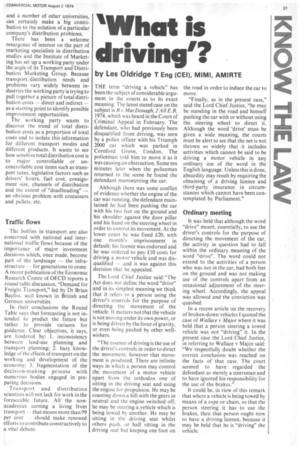'What is driving ?
Page 39

If you've noticed an error in this article please click here to report it so we can fix it.
by Les Oldridge T Eng (CEO, MIMI, AMIRTE THE term "driving a vehicle" has been the subject of considerable argument in the courts as to its exact meaning. The latest stated case on the subject is R v MacDonagh, 2AIIE.R., 1974, which was heard in the Court of Criminal Appeal in February. The defendant, who had previously been disqualified from driving, was seen by a police officer with his Triumph 2000 car which was parked in Co rnford Grove, London. The policeman told him to move it as it was causing an obstruction. Some ten minutes later when the policeman returned to the scene he found the defendant manoeuvring the car.
Although there was some conflict of evidence whether the engine of the car was running, the defendant maintained he had been pushing the car with his two feet on the ground and his shoulder against the door pillar and his hand on the steering wheel in order to control its movement. At the lower court he was fined £20, with one month's imprisonment in default; his licence was endorsed and he was ordered to pay £10 costs for driving a motor vehicle and was disqualified — and it was against this decision that he appealed.
The Lord Chief Justice said:"The Act does not define the word "drive" and in its simplest meaning we think that it refers to a person using the driver's controls for the purpose of directing the movement of the vehicle. It matters not that the vehicle is not moving under its own power, or is being driven by the force of gravity, or even being pushed by other wellwishers.
"The essence of driving is the use of the driver's controls in order to direct the movement, however that movement is produced. There are infinite ways in which a person may control the movement of a motor vehicle apart from the orthodox one of sitting in the driving seat and using the engine for propulsion. He may be coasting down a hill with the gears in neutral and the engine switched off; he may be steering a yehicle which is being towed by another. He may be sitting in the driving seat whilst others push, or half sitting in the driving seat hut keeping one foot on the road in order to induce the car to move.
"Finally, as in the present case," said the Lord Chief Justice, "he may be standing in the road and himself pushing the car with or without using the steering wheel to direct it. Although the word 'drive' must be given a wide meaning, the courts must be alert to see that the net is not thrown so widely that it includes activities which cannot be said to be driving a motor vehicle in any ordinary use of the word in the English language. Unless this is done, absurdity may result by requiring the obtaining of a driving licence and third-party insurance in circumstances which cannot have been contemplated by Parliament."
Ordinary meeting
It was held that although the word "drive" meant, essentially, to use the driver's controls for the purpose of directing the movement of the car, the activity in question had to fall within the ordinary meaning of the word "drive". The word could not extend to the activities of a person who was not in the car, had both feet on the ground and was not making use of the controls apart from an occasional adjustment of the steering wheel. Accordingly, the appeal was allowed and the conviction was quashed.
In a recent article on the recovery of broken-down vehicles I quoted the case of Wallace v Major where it was held that a person steering a towed vehicle was not "driving" it. In the present case the Lord Chief Justice, in referring to Wallace v Major said: • "We respectfully doubt whether the correct conclusion was reached on the facts of that case. The court seemed to have regarded the defendant as merely a steersman and to have ignored his responsibility for the use of the brakes.
It could be, in view of this remark that where a vehicle is being towed by means of a rope or chain, so that the person steering it has to use the brakes, then that person ought now to have a driving licence, because it may be held that he is "driving" the vehicle.




























































































